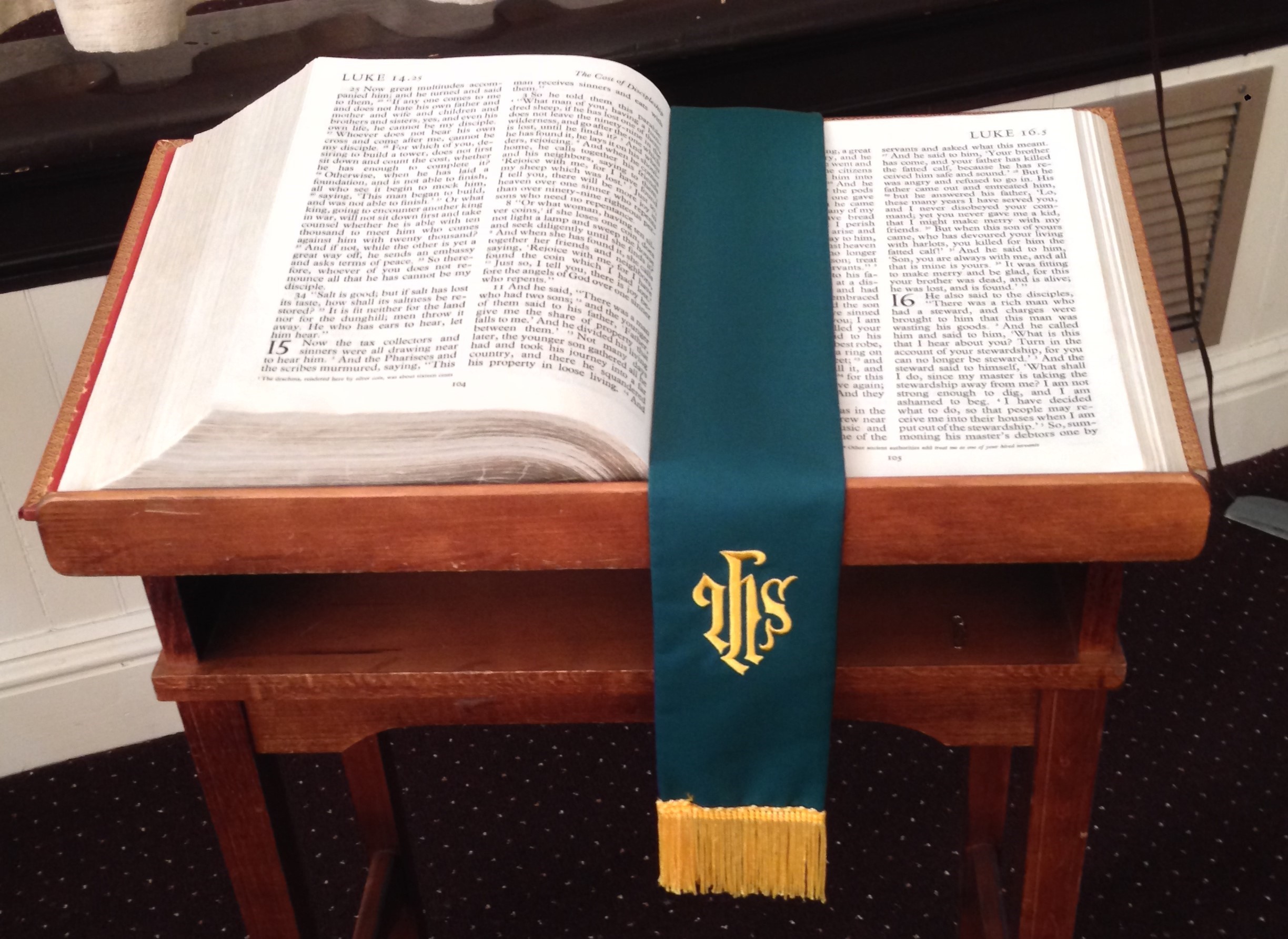Sermon Sunday August 10th, 2025
Rev. Norman A. Michaud
Luke 12: 32-40
Today’s Gospel passage comes from Luke. Luke 12: 32-40 has varied translations. In the NSRV, from which I just read, the scholars who translated this passage use the word “slaves”, not “servants”. Our Pew Bible’s translation, the RSV, uses a different translation:
37 “Blessed are those servants whom the master finds awake when he comes; truly, I say to you, he will gird himself and have them sit at the table, and he will come and serve them. 38 If he comes in the second watch, or in the third, and finds them so, blessed are those servants!”
The latter translation replaces the word “slave” with “servant.” Readers will find the switch from “slave” to “servant” in nearly all English translations. These include the Geneva Bible, the King James Bible, The Message, The NRV, the NIV, and more.
I noticed the change from “slaves” to “servants” when I read the passage as printed in our Pew Bible.
It is easy to simply conclude that “servants” or “slaves” make little difference in the thematic idea presented by Jesus in the parable. However, a “slave” is not a “servant” for one is owned and the other is free. The Greek word Jesus uses through chapters 12 and 13 is “douloi.” In Greek, “douloi” always has one meaning: slaves. The Greek word for servants is υπηρέτες.”Epsalonpieari” Why the mistranslation?
So, how did this shift happen? Poor scholarship or lost in translation may be the simplest reason for this shift in meaning. In our world the word slave and the idea of slavery remains repugnant. Abolitionists considered slavery as “America’s Original Sin.” The term highlights the inherent contradiction between the founding ideals of freedom and equality, as articulated in the Declaration of Independence, and the reality of a nation built upon the enslavement and oppression of African people.
Many recall the PBS presentation of “Upstairs, Downstairs” and the contemporary remake, “Downton Abbey.” I love to watch these shows. These shows illustrate the British notion of class and the struggles that arise when a society designates people into separate, unequal classes. There is a vast difference in equality between the servant class and the royal class. However, the servants can be fired or quit.
Slaves cannot quit, and their owners can sell them, beat them, or kill them without consequences. The rise of the servant class in Britain and elsewhere is rooted in the rise of capitalism, since the owner of a home can dismiss a servant. Still, it must sustain an enslaved person, as one must sustain property to keep its value, like we have to maintain cars, homes, and property.
Britain abolished slavery in 1772. With the expansion of the British Empire, slavery throughout the Empire was abolished in 1833. The United States abolished slavery in 1863, in the middle of the United States Civil War. These actions would seem to support Bible translations shifting the word “slave” to “servant” to adjust to the Abolitionist movements in Britain and America, resulting from new political realities. However, the shift in translation happened much earlier in both the 1362 Wycliffe Bible, the 1560 Geneva Bible, and the King James Version in 1611, all of which translate “douloi” as servant, even though it is incorrect.
Jesus uses the word douloi in chapters 12 and 13 of Luke. Jesus is consistent. So what was Jesus’ understanding of slavery in his time and context? Rome and the Empire used class distinctions much like the British. The ruling class was the Patricians, and the working class was the Plebeians. Both were citizens. The rest of society was enslaved people who had no rights. Patricians made up only 5% of the Roman population. Patricians made 95%. Enslaved people constituted another 40% of the population, but were only counted as property, like cattle and goats. Jesus knew that his people only counted because they paid taxes to Rome. If they failed to do so, they could become enslaved and could be punished with death for sedition. Jesus knew that his followers, who had given up their worldly goods to follow him, were subject to Roman judgment to become enslaved people in Roman society since they did not “Give to Caesar what was Caesar’s.” They did not pay anything to be followers of Christ.
Though many Christians consider the Bible to be immutable and literal, mainline Christians believe that the Bible speaks metaphorically. Those in the latter camp are not atheists or agnostics. They accept the power of metaphor and remain open to discussion and interpretation. The parables Jesus tells are metaphoric and used to provide lessons. Metaphors leave us pondering the power of the example. Parables require thought and contemplation; however, their meaning may evolve as readers gain new insights through education, experience, and changing context. Understanding comes with intellectual maturity. Here is such a comparative example from Matthew, which echoes today’s Gospel reading.
Matthew 24:43-44
“But understand this: if the owner of the house had known in what part of the night the thief was coming, he would have stayed awake and would not have let his house be broken into. Therefore, you also must be ready, for the Son of Man is coming at an unexpected hour.” (NRSV)
Note that both Matthew and Luke use The Son of Man as a metaphorical name for Jesus, who will become Christ. Note that both compare the coming of Christ to being prepared for a thief. In neither case do possessions comfort the homeowner when Christ shows up. Luke references Matthew. Here I recall other sayings from Luke’s Gospel:
“Do not be afraid!”
“Sell your possessions and give to the poor.”
“Provide purses for yourselves that will not wear out, a treasure in heaven that will never fail.”
“Be dressed and ready for service and keep your lamps burning.”
And finally, “You also must be ready because the Son of Man will come at an hour when you do not expect him.”
Jesus repeatedly tells his disciples and followers to give up earthly things and provide for the poor, the oppressed, prisoners, children, and widows. Jesus knows his audience. Jesus knows that his followers have misgivings and doubt. Being enslaved to God, not Rome or Temple collaborators, speaks to Christ’s followers souls and their capacity to find mercy and freedom through God’s grace, by following Jesus’ teachings. Once baptized, God takes ownership of our eternal souls and God will care for us eternally. God loves us and we are to return God’s love by following the teachings of his earthly son, Jesus Christ. Our souls are enslaved to the goodness of the Word, bound to God through the Holy Spirit.
Each of these actions requires radical action and is difficult. Each asks more from us than we may be able to do. We hear these messages again and again in parables, and we see Jesus use miracles to show us how each works. Jesus attends to the poor and blesses them, not just with words but also by sharing food. Jesus cures those who are sick in body and soul. He reaches out to widows, children, the oppressed, and prisoners. He proclaims that those in authority act as hypocrites whose words do not match their deeds. We see Jesus as a healer, provider, teacher, and theologian. His disciples often do not understand him and say so. The Sadducees and the Empire fear him and accuse him of being seditious to authority, which will get him killed. We act when we can and in ways that keep us aware of the teachings of Jesus through our declarations, followed by our actions.
“Be dressed and ready for service and keep your lamps burning.”
And finally, “You also must be ready because the Son of Man will come at an hour when you do not expect him.” Are any of us ready?
Salvation is here and will come through the resurrection, which is no metaphor. That is our shared Christian truth.
Amen


